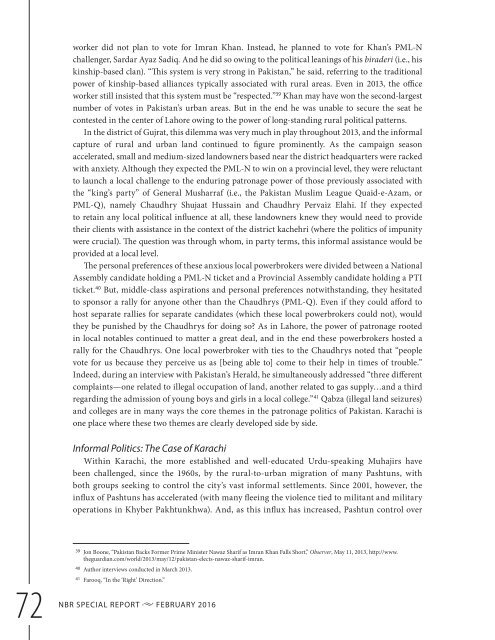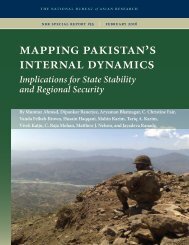pakistan’s
SR55_Mapping_Pakistan_February2016
SR55_Mapping_Pakistan_February2016
Create successful ePaper yourself
Turn your PDF publications into a flip-book with our unique Google optimized e-Paper software.
worker did not plan to vote for Imran Khan. Instead, he planned to vote for Khan’s PML-N<br />
challenger, Sardar Ayaz Sadiq. And he did so owing to the political leanings of his biraderi (i.e., his<br />
kinship-based clan). “This system is very strong in Pakistan,” he said, referring to the traditional<br />
power of kinship-based alliances typically associated with rural areas. Even in 2013, the office<br />
worker still insisted that this system must be “respected.” 39 Khan may have won the second-largest<br />
number of votes in Pakistan’s urban areas. But in the end he was unable to secure the seat he<br />
contested in the center of Lahore owing to the power of long-standing rural political patterns.<br />
In the district of Gujrat, this dilemma was very much in play throughout 2013, and the informal<br />
capture of rural and urban land continued to figure prominently. As the campaign season<br />
accelerated, small and medium-sized landowners based near the district headquarters were racked<br />
with anxiety. Although they expected the PML-N to win on a provincial level, they were reluctant<br />
to launch a local challenge to the enduring patronage power of those previously associated with<br />
the “king’s party” of General Musharraf (i.e., the Pakistan Muslim League Quaid-e-Azam, or<br />
PML-Q), namely Chaudhry Shujaat Hussain and Chaudhry Pervaiz Elahi. If they expected<br />
to retain any local political influence at all, these landowners knew they would need to provide<br />
their clients with assistance in the context of the district kachehri (where the politics of impunity<br />
were crucial). The question was through whom, in party terms, this informal assistance would be<br />
provided at a local level.<br />
The personal preferences of these anxious local powerbrokers were divided between a National<br />
Assembly candidate holding a PML-N ticket and a Provincial Assembly candidate holding a PTI<br />
ticket. 40 But, middle-class aspirations and personal preferences notwithstanding, they hesitated<br />
to sponsor a rally for anyone other than the Chaudhrys (PML-Q). Even if they could afford to<br />
host separate rallies for separate candidates (which these local powerbrokers could not), would<br />
they be punished by the Chaudhrys for doing so? As in Lahore, the power of patronage rooted<br />
in local notables continued to matter a great deal, and in the end these powerbrokers hosted a<br />
rally for the Chaudhrys. One local powerbroker with ties to the Chaudhrys noted that “people<br />
vote for us because they perceive us as [being able to] come to their help in times of trouble.”<br />
Indeed, during an interview with Pakistan’s Herald, he simultaneously addressed “three different<br />
complaints—one related to illegal occupation of land, another related to gas supply…and a third<br />
regarding the admission of young boys and girls in a local college.” 41 Qabza (illegal land seizures)<br />
and colleges are in many ways the core themes in the patronage politics of Pakistan. Karachi is<br />
one place where these two themes are clearly developed side by side.<br />
Informal Politics: The Case of Karachi<br />
Within Karachi, the more established and well-educated Urdu-speaking Muhajirs have<br />
been challenged, since the 1960s, by the rural-to-urban migration of many Pashtuns, with<br />
both groups seeking to control the city’s vast informal settlements. Since 2001, however, the<br />
influx of Pashtuns has accelerated (with many fleeing the violence tied to militant and military<br />
operations in Khyber Pakhtunkhwa). And, as this influx has increased, Pashtun control over<br />
39 Jon Boone, “Pakistan Backs Former Prime Minister Nawaz Sharif as Imran Khan Falls Short,” Observer, May 11, 2013, http://www.<br />
theguardian.com/world/2013/may/12/pakistan-elects-nawaz-sharif-imran.<br />
40 Author interviews conducted in March 2013.<br />
72<br />
NBR<br />
41 Farooq, “In the ‘Right’ Direction.”<br />
SPECIAL REPORT u FEBRUARY 2016



